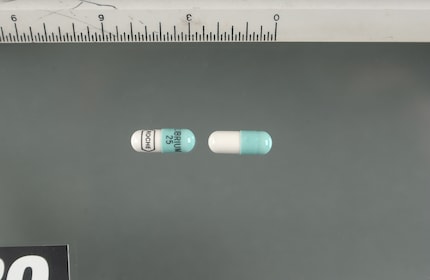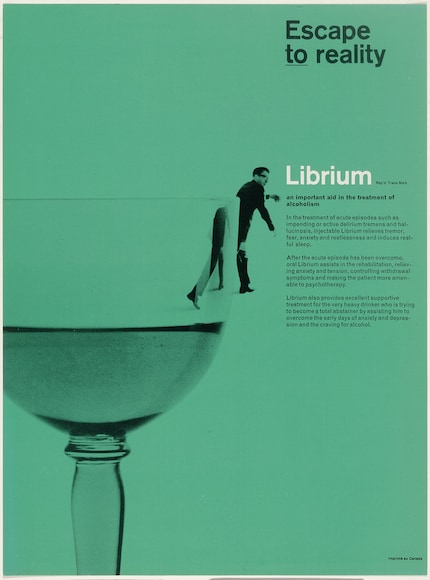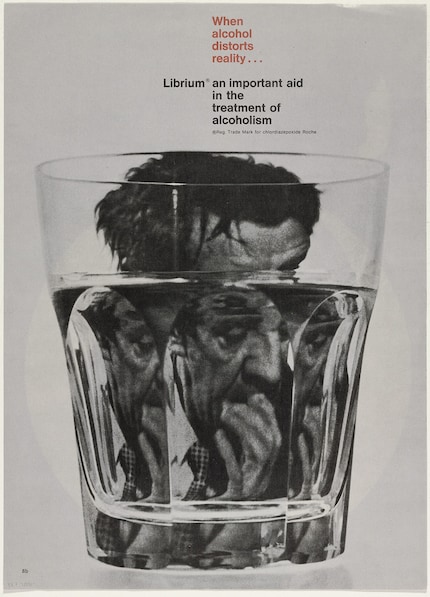

The Queen's Gambit: what’s up with all the green pills?
The Netflix series «The Queen's Gambit» chronicles the career of a female chess grandmaster with drug problems. The green pills she keeps swallowing are, in fact, real. They remain on the market to this day.
Elisabeth Harmon really wants to just be called «Beth». Beth Harmon really just wants to play chess. The orphaned young woman, played by Anya Taylor-Joy in the Netflix series «The Queen's Gambit», is very quiet. Almost robotically so. She sports a seemingly eternal poker face and appears to need just two things in life:
- Chess
- Green pills
The green pills and the game played on an eight-by-eight grid are an integral part of Beth’s being. The pills calm her down, sharpen her mind, and allow her to visualize the game board on the ceiling. And that’s how, night after night, she plays chess game after chess game.

Source: Netflix
Beth has hallucinations.
Beth takes drugs. And in doing so, she incidentally sheds light on a rather dark chapter in American history that continues to this day.
Drugs for kids, drugs for women... drugs for everyone!
First things first: what’s in those green pills Beth keeps swallowing on the daily? After her arrival to Methuen Home, a Christian orphanage, on 25 July 1957, Beth is given two pills. The man she gets them from only describes them as «vitamins». The red pill may well actually be vitamins. The green pill causes dizziness and perceptual disturbances. Beth's friend, Jolene, recommends the young redhead take the green pill in the evening. It’s supposed to be better that way.

Source: Netflix
In a later episode, the pills get a name: Xanzolam. That's what pills that Beth picks up for her adoptive mother at the pharmacy are called, some of which she proceeds to steal for herself. By that point, it's more than obvious that Beth is addicted to the pills. That much should have already been clear after the orphan broke into her orphanage’s pill stock and popped a handful of Xanzolam.

Source: Netflix
Now, Xanzolam itself isn’t real, but it is rooted in reality. Back in the 1960s, it was commonplace to give children in orphanages sedatives so they wouldn’t be quite as rebellious as kids have a habit of being. That’s the one thing. The other thing is that social norms back in the day were actually far friendlier towards drugs than we’d imagine. Coca-Cola once even contained cocaine – for the explicit purpose of getting drinkers slightly high.

Source: Department of Justice
According to US news magazine Newsweek, Xanzolam is similar to a drug called Librium, which was administered to just about anyone who halfway credibly expressed a need for it back in the day. Librium is a brand name for chlordiazepoxide, a benzodiazepine. Today, club-goers know this class of drugs as «benzos» or by one of the following names (among others):
- Valium
- Seresta
- Temesta
- Dormicum
- Xanax
- Rohypnol
Saferparty, a drug counselling office in the city of Zurich, describes the effects of benzodiazepines as follows:
Anti-anxiety, sedative, tranquilising, and muscle relaxant. At high doses: drowsiness, memory problems («blackout»).
This is consistent with behaviours exhibited by the young Beth Harmon. Aside from the fact that – as is common in TV shows and movies – the drug immediately starts working in her case, instead of only after fifteen minutes. Newsweek concludes the pills in question are, in fact, Librium; Librium pills are a dead ringer for the Xanzolam pills in the series. Today, Librium is still being produced and is under trademark protection. The right to the name is held by Meda Pharma GmbH, which was acquired by Mylan in 2016, which in turn merged with the pharmaceutical company Upjohn in 2020 and currently operates on the market under the name Viatris. That's probably why the show's creators decided to rely on the fictional drug «Xanzolam» – to keep them out of legal trouble. Regardless, Beth still buys pills she calls «Librium» twice over the course of the series.
Benzodiazepines were prescribed quite liberally in the mid-20th century. The core customers were women, both old and young. Housewives preferred swallowing pills to dealing with the ennui of being a submissive housewife. Young women had been struggling to assert themselves in colleges and the United States at large during emancipation. The result: anxiety and sleep disorders. The solution: tranquilisers. In «The Queen's Gambit», Beth's adoptive mother, Alma, is a true embodiment of this existence. Librium was prescribed by doctors primarily to treat withdrawal from alcohol and other drugs.

Source: moma.org
The Librium poster in full resolution
In at least one orphanage, sedatives were administered intravenously. In 2018, government officials were banned from administering psychotropic drugs to children of refugees without their parents' consent. These children would have been given two pills a day to keep them from becoming rebellious or even dangerous. One in the morning, one in the evening.
Withdrawal for a nation
At the time of the discovery of chlordiazepoxide – anno 1957 – little to nothing was known about its addictive nature. Other sedatives, including heroin, had long been in circulation and widely used. So, it’s no surprise that benzodiazepines weren’t banned, either. Chlordiazepoxide was the result of a research initiative in the mid-1950s by the Hoffmann-LaRoche group, now known simply as Roche. A group of chemists, led by Leo E. Sternbach and pharmacologist Lowell Randall, had been researching into the development of a «weak sedative». An error in a mixture led to the substance RO 5-0690, which was tested on animals more by chance than by design and happened to have the desired tranquilising effect. A few years later, chlordiazepoxide gave rise to diazepam, a more potent and tolerable version of the same substance.
In 1960, Librium found its way onto the market. Being soothing and relaxing, it was prescribed to Americans. Especially those experiencing drug or alcohol withdrawal. Beth swallowing Librium in the fictional year of 1957 is no surprise, as the series takes more than one liberty. According to the book the series is based on, by author Walter Tevis, Beth enters the orphanage in 1957 at the age of 9. There, she gets the Librium-analogue, Xanzolam, twice a day. At the age of about 13, so around 1961 in the series, she’s forced into withdrawal after the administration of Xanzolam to orphans is banned.

Source: moma.org
This ban was not enacted in the real world until 1975. That very year, Librium was high in the ranking of best-selling pills in the United States. One billion pills had been sold in 1974. As of 2 July 1975, pharmacies were allowed to refill prescriptions for Librium and Valium only five times. And if the prescription was older than six months, there would be no more pills at all.
In short, the nation was forced into withdrawal.
Purely mathematically, the one billion pills sold were enough to give every person in the United States a week's worth of Librium. According to the «International Journal of Health Services
Vol. 7, No. 1, Special Issue: The Economy, Medicine, and Health», Valium and Librium were prescribed for non-medical or non-psychological problems in the 1970s, without addressing the underlying issues.
50 million pills a year and counting
To this day, Librium and other benzodiazepines are being prescribed by doctors and dealt on the streets. In the United States, 50 million pills are prescribed each year. They’re not all being abused. The Federal Office of Public Health (FOPH) (page in German) states that, in Switzerland, an estimated 200,000 to 400,000 people exhibit a «problematic use of benzodiazepines and similar drugs».
7.4 percent of the population has used a sleeping pill or sedative at least once in the past 30 days. The rate of people over the age of 15 who have been using such drugs almost daily for at least three months is 3.1 percent. Women are more affected than men.
The Swiss Association of Cantonal Officers of Health describes benzodiazepines as «safe and effective substances with few side effects and low toxicity» (link in German). However, these «helpful substances» should only be prescribed for a short period of time. There’s no mention of addiction in connection with benzodiazepines in the Association’s guideline. But it does say, «Dose reduction has to be done carefully and not too fast. Benzodiazepines should not be stopped abruptly.» This is an easy way to minimise any withdrawal symptoms. According to Ecoplan (in German), the withdrawal symptoms are often similar to the symptoms the benzodiazepines were initially prescribed for in the first place.
Netflix's «The Queen's Gambit» doesn’t just look at addiction as a coping mechanism for everyday life, but also at its further-reaching effects. The documentary series «The Pharmacist» explores the effects of the pill pandemic in the United States against the backdrop of a murder case.
If you need help with addiction issues, Sucht Schweiz is here for you.
Journalist. Author. Hacker. A storyteller searching for boundaries, secrets and taboos – putting the world to paper. Not because I can but because I can’t not.
Interesting facts about products, behind-the-scenes looks at manufacturers and deep-dives on interesting people.
Show allThese articles might also interest you

Background information
Weird records, expensive adjudicators and propaganda: facts about the Guinness Book of Records
by Martin Jungfer

Background information
Everything’s better these days! Seven reasons why family driving holidays are becoming more and more enjoyable
by Michael Restin

Background information
Fisher Price, we need to talk!
by Ann-Kathrin Schäfer

